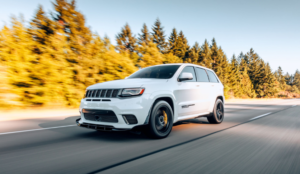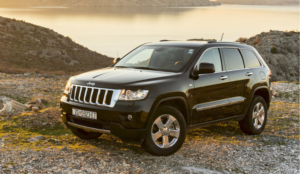Detailed exploration of the “Problems with Jeep Grand Cherokee 2004”. This robust SUV, renowned for its strength and off-road capability, has been a popular choice among car enthusiasts and families alike. However, like any vehicle, it’s not without its share of challenges. In this article, we delve deep into the common issues faced by owners of the 2004 Jeep Grand Cherokee. From electrical glitches to transmission woes, we cover the spectrum of problems that might arise with this model.
Our goal is to provide you with a comprehensive understanding of what to expect if you own or are considering purchasing this particular model of the Grand Cherokee. So, whether you’re a long-time Jeep owner or a potential buyer, this article is your go-to guide for navigating the quirks and challenges of the 2004 Jeep Grand Cherokee.
Exploring the Reliability of the 2004 Jeep Grand Cherokee
When it comes to reliability, the 2004 Jeep Grand Cherokee has had a mixed reception. It’s a vehicle known for its robust build and off-road capabilities, but it’s not without its flaws.
Long-Term Reliability Overview: Generally, the 2004 Grand Cherokee has shown decent longevity, but it does have its share of mechanical and electrical issues that can arise as it ages. The key to extending its life is regular maintenance and addressing small problems before they become bigger.
Automotive Community Perception: Among Jeep enthusiasts and automotive experts, the 2004 Grand Cherokee is often praised for its strong engine performance and off-road prowess. However, it’s also critiqued for the frequency of repairs and maintenance needs, especially in higher-mileage vehicles.
Common Electrical Problems in the 2004 Jeep Grand Cherokee

Electrical issues in the 2004 Jeep Grand Cherokee are not uncommon. Many owners have shared their experiences with various electrical problems that range from minor annoyances to significant concerns that can affect the vehicle’s functionality and safety.
The range of electrical problems in the 2004 Jeep Grand Cherokee varies widely, from faulty wiring to more complex issues with the dashboard and instrument panel.
Owners of the 2004 Jeep Grand Cherokee have encountered several electrical issues. Here’s a closer look at some of the most common problems:
- Dashboard Light Issues: A frequent complaint involves the dashboard lights. Owners have reported that these lights flicker or, in some cases, go out completely. This can be particularly problematic at night or in low visibility conditions, as it affects the driver’s ability to monitor speed, fuel level, and other critical indicators.
- Malfunctioning Power Windows: Another common problem is with the power windows. Some owners have found that the windows either fail to open or close properly, or operate intermittently. This not only causes inconvenience but can also be a security concern.
- Battery Drainage: A more serious issue that some have faced is related to the vehicle’s electrical system draining the battery. This can lead to scenarios where the car refuses to start or experiences power failures while driving.
- Causes and Solutions:
- Faulty Wiring: In many cases, these problems stem from faulty wiring. Over time, wires can fray, corrode, or disconnect, leading to these various electrical issues.
- Professional Diagnostics: Addressing these electrical problems often requires professional diagnostics. This is because tracing the exact source of an electrical issue can be complex and requires specialized knowledge and equipment.
- Component Replacement: In some cases, fixing these issues might involve replacing specific electrical components like fuses, relays, or even wiring sections.
Addressing these electrical problems can be challenging, especially for those unfamiliar with automotive electrical systems. It’s usually recommended to seek assistance from a professional mechanic with experience with Jeep vehicles. Regular maintenance checks can also help identify and address these issues before they lead to more significant problems.
Transmission Challenges Faced by 2004 Jeep Grand Cherokee Owners
The 2004 Jeep Grand Cherokee, while known for its robustness and off-road capabilities, has its fair share of transmission issues. These problems can be particularly frustrating for owners, as they directly impact the vehicle’s performance and driving experience.
Owners of the 2004 Jeep Grand Cherokee often face transmission issues, with slipping gears and delayed shifting being the most common complaints.
Transmission problems in the 2004 Jeep Grand Cherokee can present in various ways, affecting how the vehicle drives and responds. Here’s a deeper look into these issues:
- Slipping Gears: This is when the transmission unexpectedly slips from one gear to another, or when it slips in and out of gear. This can be unsettling for the driver, as the vehicle might feel like it’s losing power or ‘jerking’.
- Delayed Shifting: This issue is noticeable when there is a delay in gear shifting. Instead of smooth transitions, the vehicle may hesitate before shifting gears, sometimes accompanied by a noticeable ‘thud’ or ‘clunk’.
- Symptoms and Experiences:
- Hesitation in Response: When the gas pedal is pressed, the vehicle may hesitate or delay responding. This can be a sign of transmission issues affecting the vehicle’s ability to accelerate properly.
- Jerking Motion: A jerking or jolting sensation, especially when shifting gears, can indicate that the transmission isn’t engaging gears smoothly.
- Maintenance and Repairs:
- Regular Transmission Fluid Checks: One of the simplest yet most effective ways to maintain the transmission health is to check and change the transmission fluid regularly. Dirty or low fluid can lead to a host of transmission problems.
- Professional Diagnosis: If you are experiencing these issues, it’s often necessary to have a professional diagnose the problem. They can provide a detailed assessment and recommend the best course of action.
- Potential for Costly Repairs: In some cases, repairing these transmission issues can be quite costly. This could range from minor repairs to a complete transmission rebuild, depending on the severity of the problem.
It’s important for owners to be aware of these potential transmission issues and to address any signs of trouble early. Regular maintenance and prompt attention to any shifts in transmission performance can go a long way in preventing more serious and expensive repairs down the line.
The 2004 Jeep Grand Cherokee and Engine Performance Issues
The engine is at the heart of many discussions when it comes to the performance of the 2004 Jeep Grand Cherokee. This model, known for its ruggedness and reliability, has also been the subject of some engine-related concerns raised by owners over the years.
Among the most common engine problems faced by the 2004 Jeep Grand Cherokee are issues like overheating and oil leaks, which can significantly impact the vehicle’s performance and longevity.
Let’s break down these common engine issues to understand them better:
- Overheating Issues: Overheating is a critical problem in the 2004 Jeep Grand Cherokee and can be quite worrying for any owner. Here’s what typically causes it:
- Radiator Problems: The radiator might be clogged or damaged, preventing it from cooling the engine effectively.
- Coolant System: Issues in the coolant system, such as leaks or a malfunctioning thermostat, can also lead to overheating.
- Preventative Measures: Regular checks of the coolant levels, ensuring the radiator is in good condition, and monitoring the thermostat are essential steps in preventing overheating.
- Oil Leaks: Oil leaks are another concern that can affect the engine’s performance.
- Worn Gaskets or Seals: Over time, gaskets and seals can wear out, leading to oil leaks. These leaks not only reduce the oil levels in the engine but can also cause damage if not addressed promptly.
- Regular Engine Checks: Keeping an eye on oil levels and checking for any signs of leakage under the vehicle can help catch these issues early.
- Timely Oil Changes: Regular oil changes are crucial. Not only do they keep the engine running smoothly, but they also give a chance to inspect for any signs of wear and tear that could lead to leaks.
Addressing these engine performance issues is key to maintaining the health and longevity of your 2004 Jeep Grand Cherokee. Regular maintenance checks, especially by a professional, can help identify these problems early on. Immediate attention to any signs of overheating or oil leaks can prevent more significant and costly repairs down the line.
Steering and Suspension Concerns in the 2004 Jeep Grand Cherokee

The steering and suspension systems are vital for a comfortable and safe ride, and some 2004 Grand Cherokee models have had issues in this area.
Owners have reported concerns such as a stiff or unresponsive steering and problems with the shocks and struts.
These issues can lead to a less comfortable ride and potentially decrease the vehicle’s handling capabilities. Regular inspections and maintenance of the suspension and steering components are recommended to ensure a smooth ride.
Navigating Interior and Exterior Durability Issues
Like any vehicle, the 2004 Grand Cherokee faces wear and tear both inside and out.
Common interior issues include upholstery wear, while exterior problems often involve paint quality and rusting. Protecting the vehicle from extreme weather conditions and regular cleaning can help preserve both the interior and exterior. For rust issues, early detection and treatment are key.
Safety Recalls and Concerns for the 2004 Jeep Grand Cherokee
Staying informed about recalls is crucial for any vehicle owner.
The 2004 Grand Cherokee has had several recalls over the years, addressing issues ranging from airbag safety to fuel system problems. Owners should check the National Highway Traffic Safety Administration (NHTSA) database for the latest recall information and ensure that any necessary repairs are completed.
Fuel Efficiency and Environmental Concerns of the 2004 Jeep Grand Cherokee
Fuel efficiency is important, especially for older models like the 2004 Grand Cherokee.
The 2004 model is unknown for its fuel efficiency, especially compared to newer SUVs. With advancements in technology, newer models have significantly better fuel economy. However, regular maintenance like tire pressure checks and engine tune-ups can help optimize the fuel efficiency of the 2004 model.
FAQ about problems with jeep grand cherokee 2004
What Are the Most Common Repairs Needed for the 2004 Jeep Grand Cherokee?
Frequent repairs include electrical system fixes, transmission repairs, and addressing engine cooling issues.
How Does the 2004 Jeep Grand Cherokee Compare to Other SUVs of Its Era?
It stands out for its off-road capabilities but falls short in areas like fuel efficiency and repair frequency.
Is the 2004 Jeep Grand Cherokee a Good Purchase in Today’s Market?
It can be a good purchase for those looking for a sturdy off-road vehicle and who are aware of its maintenance needs.
What Are the Typical Costs Associated with Repairing the 2004 Jeep Grand Cherokee?
Repair costs can vary widely but tend to be higher for transmission and engine issues.
How Can Owners Prevent Common Issues with the 2004 Jeep Grand Cherokee?
Regular maintenance is key, including fluid checks, tire maintenance, and timely repairs.
Conclusion
The 2004 Jeep Grand Cherokee has a strong legacy, known for its off-road capabilities and robust build. However, like any vehicle, it has problems that potential buyers and current owners should know. Regular maintenance and staying informed about common issues can help ensure a long and healthy vehicle life.

Hello there, this is Thomas Byrd. I am a professional car mechanic who leads a team of junior mechanics in a repair and restoration shop. In the beginning, I used to work for a jeep service center as a basic worker. From there I keep learning, changed my job 2 times and now I am a professional who leads a group of mechanics. Though a have expertise in the jeep, I know very well about all types of cars. To share my knowledge and skills with others I have created this blog website. Whenever I get free time from work I give my time to my blog.

